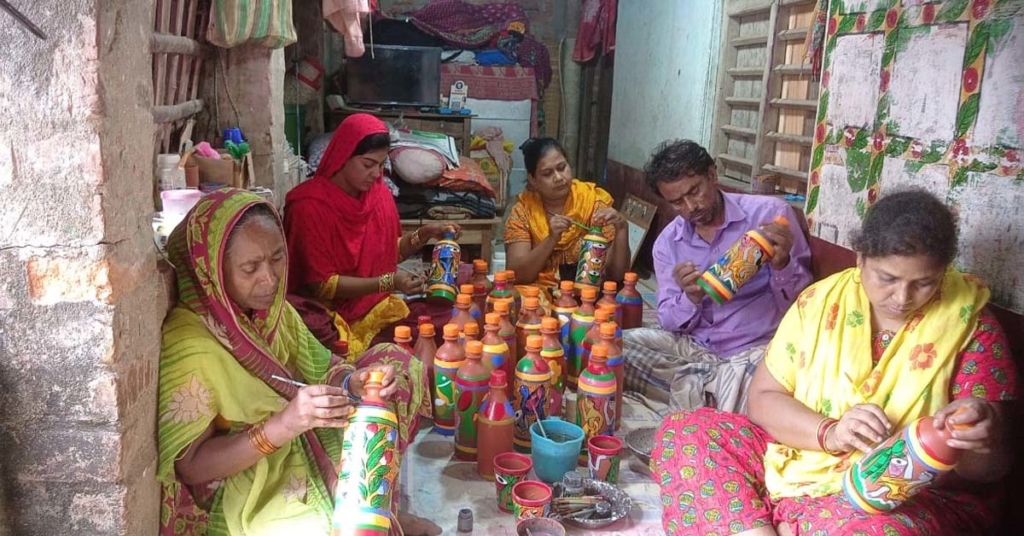Once upon a time, summer quenchers were made from the water that mothers and grandmothers stored in earthen pots. In extreme heat, a drink of cold water kept in earthenware pots was all that one needed. Once in a while, this water was also used to make lemonade and sharbat, and had a taste and aroma unique to the season and the land. In Bengal, the practice of keeping water in a terracotta jug or pot is timeless. However now, especially in urban Bengali households, plastic and glass bottles have replaced earthenware ones.
With global warming the summer temperatures are peaking across the country. Add to that a severe water shortage in many places. In the heatwave people have been asked to carry water bottles when they step out of the home. However, according to experts, drinking water from a plastic bottle can be harmful to the human body as chemicals leach into the water, especially when it is out in the sun. A recent stroll in the market threw up a pleasant surprise for me. I saw beautifully painted terracotta bottles being sold. These offered all the benefits of terracotta water containers, and were beautifully painted with folk art, to double up as decor.
There were many buyers too. The water kept in these terracotta bottles stays cold for a long time, said the potters, and it does not have any harmful effect on the body.
CJP’s Grassroots Fellowship Program is a unique initiative aiming to give voice and agency to the young, from among the communities with whom we work closely. These presently include migrant workers, Dalits, Adivasis and forest workers. CJP Fellows report on issues closest to their hearts and home, and are making impactful change every day. We hope to expand this to include far reaching ethnicities, diverse genders, Muslim artisans, sanitation workers and manual scavengers. Our raison d’etre is to dot India’s vast landscape with the committed human rights workers who carry in their hearts, Constitutional values, to transform India into what our nation’s founders dreamt it to be. Please Donate Now to increase the band of CJP Grassroot Fellows.
It was also good to see that the art of pottery was also receiving this season. The potters had understood the market demands, and changed the size of the earthenware vessels according to customer feedback. These terracotta bottles are being made in the same shape as the plastic or glass bottles, and are as easy to use. They are easy to carry in a bag and are spill proof, say the potters. Each one litre water bottle is sold for Rs 150 only. These are environmentally friendly, and can be safely used for a long time in any weather condition.
These water bottles are being sold in East Midnapore, Burdwan, Birbhum, West Midnapore etc districts. Many look like artwork and have been hand painted by the master potters. The colours and motifs are eternally Bengali. Some are even buying the bottles as decor items for their homes and offices.
According to painter Abed Chitrakar, the artists buy the bottles from Dutta Pukur area of North 24 Parganas. “Then I sell it after painting with traditional motifs,” he says. Each artist can paint around 10-12 bottles throughout the day. The bottles are selling well this summer. According to the locals, drinking water stored in earthenware adds minerals needed for the body to combat the summer heat. They say this apparently helps digestion and is a natural coolant in itself. Just what is needed as summer is far from over.
This report is part of CJP’s Grassroots Fellowship Program, and has been written by researcher Ripon Sheikh, who is travelling around rural Bengal, tracking and documenting social and cultural movements of indigenous people.
Meet CJP Grassroot Fellow Mohammed Ripon Sheikh
This young man, who has graduated with a B.Sc degree from Burdwan University, loves trivia. Sheikh’s passion to research and seek “unknown information about World History” has earned him many medals and trophies at various University and state-level Quiz championships, and youth festivals.
Sheikh is a born orator and a natural community leader. He has the potential to represent his community, state and country at a global level one day. His immediate goal, however, is to find a job so he can support his parents.
Related:
A boy, lost and found.. yet still lost
CJP IMPACT: Four migrant workers from WB get long-pending wages

